Text
Introduction
When we were thinking about a final project to bookend both the practical and theoretical knowledge that we’ve accrued through UGBA 155 and small group sessions, we were hoping to do something that bridges creativity with data insights (and in turn, bridging the various S and N types in our group). All of us were struck by the defining moments we heard during class and we thought it would be a really cool idea to curate some defining moments from people we saw in our everyday lives. We sent out a survey to 49 people and asked them the following questions: What is your Myers-Briggs personality type, if you know it?, Do you see yourself as a leader?, Explain your answer to why or why you don’t see yourself as a leader, Describe a defining moment in your life, and What are you currently involved in? With the permission of the people who filled out the survey, we posted these inspiring and insightful responses to a blog site and tried to humanize some of the everyday leaders we surround ourselves with. The below write-up is our analysis of the dataset where we ask ourselves some questions about personal leadership, defining moments, and how MBTI ties into all of these responses.
0 notes
Photo
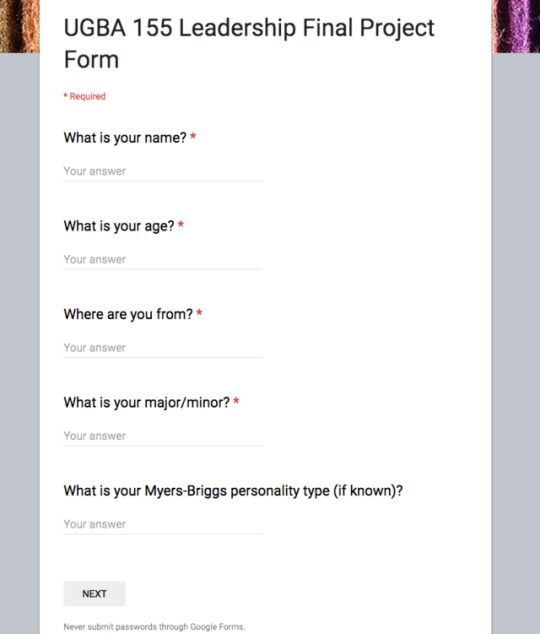
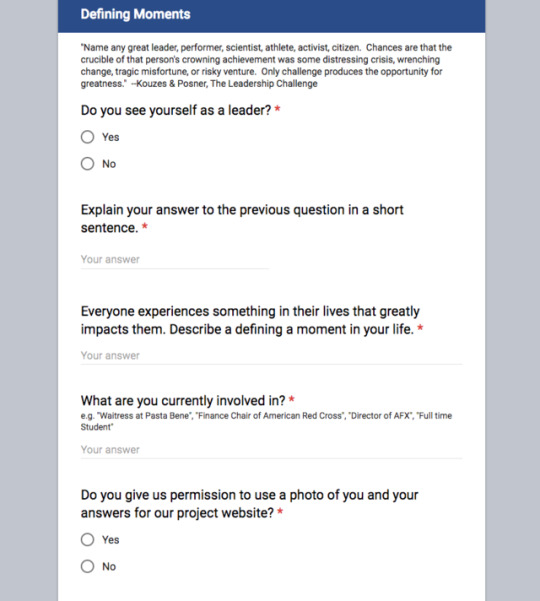
The survey we sent out. We received 49 responses, 41 of which gave us permission to publish their responses.
0 notes
Text
What is the role of legitimate power in self-perception?
The definition of legitimate power is power that one derives from a formal position or office held in an organization’s hierarchy of authority. Many people confer legitimate power and view it as a requirement for leadership.
One hypothesis we considered when it comes to answering this question of “Am I a leader?” was that being in a leadership position may influence one’s self-perception as a leader. After all, if society calls you a leader, would you not see yourself as a leader? However, the responses we got from the students we surveyed didn’t show a very strong relationship between the two, and taking a closer look at the explanations students gave for their answers to “Am I a leader?” shows even greater disparity.
While we did see about ⅓ of responses from self-proclaimed leaders support their response with the fact that they are in a leadership position, this only seems to show that it is a possible influencer upon their own self-perception as a leader. From the nine people who did not see themselves as leaders, five were in leadership positions, and several were heads of entire organizations, showing that despite the power conferred to them by large groups of people and their societal label as “leaders”, their positions of authority did not seem to influence their self-perception as leaders.
Analysis of respondents’ explanations to “Am I a leader?” shows that while being in a leadership position has helped many leaders emerge, the simple fact that they are in a leadership position does not necessarily influence self-identification as leaders. Further analysis shows that their definitions of leadership go beyond legitimate power. We will analyze further the many definitions of leadership later on in the paper.
-Jacinta Lu
0 notes
Text
Why do people say no to the leader question?
Despite each of our participant’s amazing achievements and involvements in organizations and causes around campus and beyond, there were several (a total of nine) individuals who answered “no” to the question, Do you see yourself as a leader? We were curious to find out why they responded in the negative—was it alternate definitions of leadership, self-doubt, or something else?
Based on participant’s responses, it appears that the primary reason for “no” responses was varying definitions of what it means to be a leader. In particular, several survey-takers were victims of the classic confusion between leadership and authority. They gave responses such as “I don’t like bossing people around,” “I would rather have … influence without the burden of a title,” and “I don’t like the spotlight.”
Others, in similar responses, expressed a distinction between leaders and followers, as well as a proclivity for the latter. Their responses included “I’m more comfortable as a follower,” “I find myself following more than leading,” and “I really enjoy being able to help as much as I can rather than get people to help me.”
A third trend in the responses was a lack of confidence and self-doubt in one’s own ability to be a leader. These participants said “if I’m not confident, I tend to be led,” “I have had encounters [of leadership], but I haven't been able to create greatness out of it,” and “I don’t ever have the motivation to lead a group if it is in good hands.”
Each of these no responses demonstrates a fundamental lack of understanding of what it means to be a leader and to lead others. Each of these respondents appears to view leaders as singular individuals or entities, those with power and authority, and as existing in a position that’s distinct and separate from their own. What they fail to understand is that anyone can be a leader regardless of position, and that leadership behavior is found in individuals at all levels of organizations.
“No” respondents furthermore viewed leadership as requiring vital knowledge of the organization and relevant skills for task at hand, along with high levels of confidence and even some despotic qualities. In other words, they appear to view leadership as acts of immense greatness that require greatness in and on behalf of individuals. They don’t see that even a simple compliment or small contribution to a project can be an act of leadership. Leadership is great, but it certainly doesn’t require greatness (at least not most people’s idea of greatness).
-Chris Terry
0 notes
Text
How do people define a leader?
To the non-UGBA 155 student, leadership can feel like a burdensome word that carries heavy connotations. From the sample of 49 students that we asked, here are the 50 most common words used in their responses to why they consider (or don’t consider) themselves a leader. These words can be broken down further to pinpoint the expectations of what a leader should be.
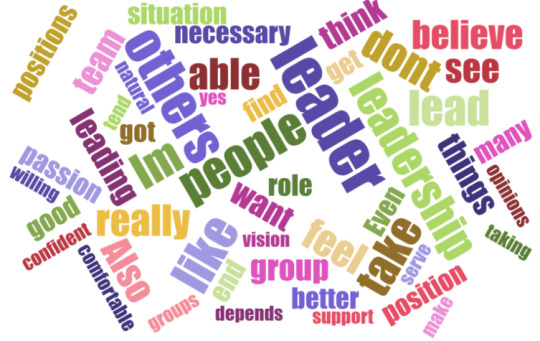
Confident, comfortable, natural
Coming into this class, a lot of our team members had the notion that leaders are born and it looks like a lot of the people in our sample group share the same idea of a true leader. Words that indicate that leadership comes easily to some can be quite detrimental, especially because even really great leaders face tough decisions that make them question their judgement. Having this stock idea of what a leader should be can force people to fall into the trap of finding technical solutions to adaptive challenges, because they put themselves in the mindset of their perfect leader.
Passion, vision
It was interesting to see that inspiring a shared vision and expressing passion are traits that are evident in a leader outside of those trained to know Kouzes and Posner’s five exemplary traits. Vision can be very palpable to team members and the fact that people mentioned these words so frequently shows how memorable leaders that breathe life into their passion and vision can be to teams.
Team, group, support, serve, others
The role of the leader in giving the work back to the team seems to be a trait that transcends the theoretical frameworks that we’ve learned in the class. A lot of people in our sample set expressed how important it was that a leader work to support a group of people instead of leading through a hierarchical approach. In a lot of ways, UGBA 155 solidified some of the things we already knew leaders had to possess and demystified others. It would be interesting to see how the sample would fare if we extended this past just Berkeley students, who get a lot of leadership experience first-hand by being in so many student organizations, to schools that don’t have as many opportunities to display their leadership.
-Ikya Kandula
0 notes
Photo

Melinda An, 21
Hometown: Diamond Bar, CA
Major: Business Administration
MBTI: ISFJ
Currently: Sigma Omicron Pi Sorority, ABA Consulting, Chief Financial Officer of United Abacus Arithmetic Association, Tutor, Full-time Student
Do you see yourself as a leader? No. I will take charge if necessary, but I don't like the spotlight. I would rather have a larger influence without the burden of a title.
Defining Moment: In middle school, I transferred from a private school to a public school due to ongoing family complications. I entered as a naïve girl, eager to fit in and experience new opportunities. School had always been my escape from problems at home. Unfortunately, as the new kid on the block, I was soon the main target for hate crimes, physical assaults, and cyber-bullying. I was also sexually assaulted by my “best” and only friend at the time. As a result, I became anorexic, prone to anxiety attacks, and severely depressed (according to doctors). At 5’7, I weighed merely 55lbs (half of my initial weight) and essentially lived off various pills. With frequent blackouts, liver failure, heart murmurs, and suicidal tendencies, I wondered how soon it would be before my body gave up. Saying “no” became my defense mechanism and my way of surviving in an unpredictably cruel world. If I could say “no” to food, I believed that I would have control over my life – that I would be strong and that everything would be okay. Thus, I suppressed my feelings, ignored the situation, and rejected those who tried to help me. I needed to be my own savior, so nobody could ever hurt me or have jurisdiction over my life again.
However, this way of thinking subconsciously followed me throughout my life and still negatively impacts me today. Ironically, the more I sought control over my life, the more I lost control over my life. I turned into a different person, one who was terrified of change, unwilling to take risks, and extremely submissive. Even now, I have trouble understanding my emotions, fear speaking up, and restrain myself from getting too close to others. Nonetheless, in an act of courage, I forced myself to face my past and understand its impact on me. After years of suffering in silence and desensitizing myself to the situation, I finally opened up to my close friend about it during senior year of high school. I cannot describe how amazing it felt to finally tell someone who could validate my feelings and offer me unconditional support. It felt like great burden was lifted off my shoulders – like I was finally seeing the light at the end of the tunnel. Though reopening this wound was extremely daunting, it was the greatest defining moment in my life because it pushed me to recover. It made me realize that I did matter and that my dark past did not define me. This moment was the moment I decided to live.
0 notes
Photo
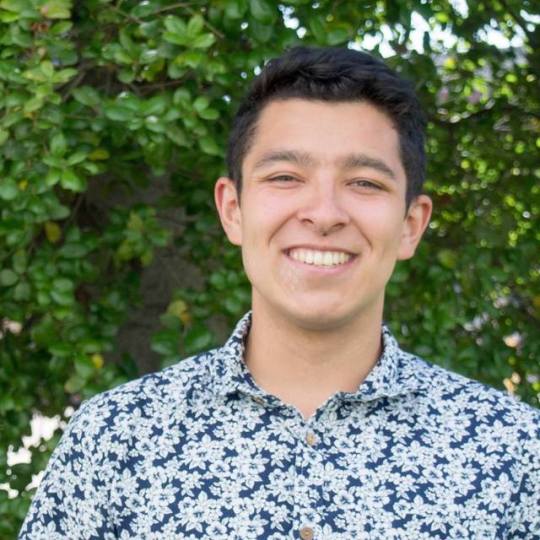
Juan Rodriguez, 21
Hometown: Palm Springs, CA
Major: ISF (Public Health & Econ)
MBTI: ENFP
Currently: Development Manager Daily Cal, Finance Intern Berkeley City Club Conservancy
Do you see yourself as a leader? Leaders are able to make something out of nothing.
Defining Moment: My immediate family was thrown a curve ball and went through really tough times, but when there was nothing to work with we all made it through and things are better than ever.
0 notes
Photo

Marit Arnesen, 24
Hometown: Norway
Major: Sociology
MBTI: ENFP
Currently: Full time student, working with people with special needs
Do you see yourself as a leader? No. I connect with people easily and are good to organize.
Defining Moment: working with people with special needs have helped me a lot to learn to see things from others perspective.
0 notes
Photo

Michelle Yang, 20
Hometown: Albany, CA
Major: EECS
MBTI: Unkown
Currently: Full time student
Do you see yourself as a leader? Yes. I think there are multiple facets of leadership, one that includes being passionate with and accomplished at what you do.
Defining Moment: Junior year of high school, when my project partner plagiarized and got everyone to think it was my fault.
0 notes
Text
What is the correlation between MBTI and people’s response to whether they considered themselves a leader?
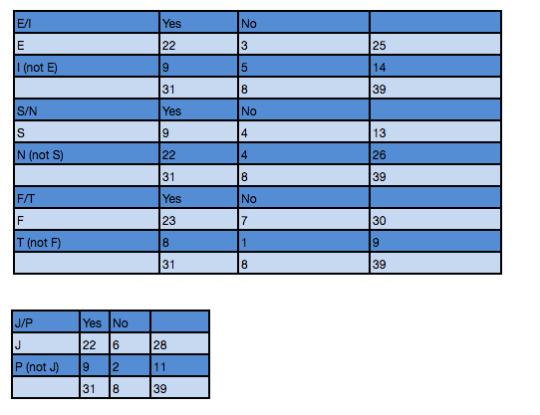
E/I: OR = [(22)(5)]/[(3)(9)] = 4.074
S/N: OR = [(9)(4)]/[(22)(4)] = 0.409
F/T: OR = [(23)(1)]/[(8)(7)] = 0.411
J/P: OR = [(22)(2)]/[(6)(9)] = 0.815
This analysis comprised of a quantitative assessment of the reported Myers Briggs Personality Types and the respondents’ response to the question “Do you consider yourself a leader?” A few responses had to be removed before analysis was conducted due to incompleteness, which resulted in N=39. We acknowledge that this is a very small and limited sample size and that selection and information bias could be present from the data we collected.
The respondents’ answers were categorized based on their indicated personality type—Extraversion or Introversion, Sensing or Intuition, Feeling or Thinking, and Judging or Perceiving—and by whether they considered themselves to be a leader, “Yes,” or did not consider themselves to be a leader, “No.” After creating 2 x 2 tables, we were able to ascertain the appropriate measure of association—an odds ratio. The calculated odds ratios can be interpreted using this general form: the odds of being a/an [E/S/F/J] among those who do consider themselves to be a leader is [OR] times the odds of being a/an [E/S/F/J] among those who do not consider themselves to be a leader. For instance, the odds of being a S among those who do consider themselves to be a leader is 0.409 times the odds of being a S among those who do not consider themselves to be a leader.
Interpreting these odds ratios gives us insight into how personality type classifications may correlate with individuals’ self-perception of their leadership capacity. The most significant association we found was for extraverts and introverts, as there are almost 4 times the odds of those who consider themselves to be a leader to have an extraverted personality type. This could be because that extraverted people typically are more outgoing and socially engaged, which could make them feel like they play a larger role in leadership activities. On the other hand, the association between the J/P personality type and perception of leadership was the smallest because it yielded the smallest measure of association in regards to orders of magnitude. The associations for the S/N and F/T personality types are very similar but both show that the odds of being a S/F, as opposed to a N/T, for is lower those who consider themselves to be a leader when compared to those who do not consider themselves to be a leader. While this is just a exploration into potential associations, further research would need to be conducted with a larger sample and take into account temperaments as well.
-Raj Fadadu
0 notes
Photo

Sandra Herchen, 21
Hometown: Palo Alto, CA
Major: Statistics
MBTI: ISFJ
Currently: President of the Undergraduate Statistics Association, Captain of IM Volleyball team, Full time Student, Member of Klesis Christian Fellowship
Do you see yourself as a leader? Yes. I find being in a leadership position natural for myself.
Defining Moment: Winning the case competition at business camp freshman year of high school -- I was the group leader.
0 notes
Photo

Pranav Trewn, 21
Hometown: Davis, CA
Major: Economics (Minor: Education)
MBTI: N/A
Currently: Manager of SUPERB Productions, Staff Writer at Stereogum, soon-to-be Associate at ideas42
Do you see yourself as a leader? I try to act in ways that would be considered virtuous to others, in a manner that would perhaps inspire them to act the same.
Defining Moment: When I cut my hair for the first time before high school, effectively abandoning my parents Sikh religion.
0 notes
Photo

Vittorio Tosi, 21
Hometown: Italy
Major: Business Administration
MBTI: Unknown
Currently: Philanthropist and full time student.
Do you see yourself as a leader? Yes, I know what I want and how to get it.
Defining Moment: I had an accident while skiing. I woke up without understanding where I was and what I was doing. I didn't recognize some faces and couldn't remember parts of my past. As time went by, I started having my memories back (it took 2 weeks~), but I will never have the certainty of remembering my entire past and not just part of it.
0 notes
Photo

Jennifer Chang, 20
Hometown: Fremont, CA
Major: Nutritional Science--Physiology and Metabolism
MBTI: INTJ
Currently: Treasurer of Food Science and Tech, College of Natural Resources Peer Advising, Alumni Events Coordinator of Cal Alumni Student Association, Research, General Member for Pre-Dental Society, Volunteer
Do you see yourself as a leader? I listen to others' suggestions and opinions but in the end I make the call. I am also willing to speak up about my own thoughts and take the initiative.
Defining Moment: Definitely getting into Berkeley was a big defining moment in my life and finally deciding my career path.
0 notes
Photo
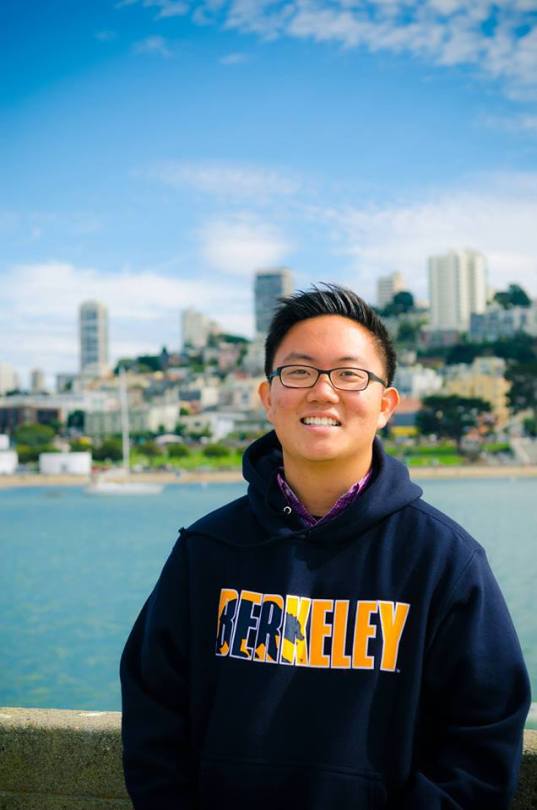
Eric Kook, 22
Hometown: Fullerton
Major: Legal Studies
MBTI: INTJ
Currently: President of Chun Jin Ahm.
Do you see yourself as a leader? Yes. I am able to lead conversations in small or large groups and am able to express my opinions with relative ease.
Defining Moment: Freshman year of high school I tried out for my tennis team but was unfortunately cut. However, I felt I had been wronged because I believed that my tennis skill and acumen was better than most that had been allowed on the team. Coach told me that I had been cut due to a lack of drive and passion. However, he did give me another shot at proving him wrong and I did just that. From that experience, I learned to never take anything for granted whether it be skill, knowledge, or power because one can never truly know what will happen.
0 notes
Photo

Pooja Lalchandani, 22
Hometown: Los Altos, CA
Major: Molecular Cell Biology
MBTI: ENFJ
Currently: Projects Director of Project RISHI, Working on MCB Honors thesis research, Volunteer at Women's Cancer Resource Center & Lifelong Medical Care
Do you see yourself as a leader? I definitely didn't always feel this way, but college has really made me realize that I really enjoy leading and teaching others.
Defining Moment: Joining a non-profit freshman year because it completely changed my outlook on what I want to do with my life.
0 notes
Photo

Serena Wang, 21
Hometown: San Diego, CA
Major: Business Administration and Education
MBTI: ESFJ
Currently: Church Operations at LivingWater Church, Founder/CEO of YHWH Apparel, Founder/President of Hands and Feet, Prayer Team at LivingWater Church, Team Captain of Co-Rec IM Basketball, Member of 4 Intramural Teams
Do you see yourself as a leader? Yes. I think of myself as a leader because I have a team under me, and I am continually a learner that seeks to better empower others. Also, I have a vision- and I seek out to accomplish it, by creating a team with the same amount of passion.
Defining Moment: I think I'm still in the process of living this defining moment, but college has definitely had continuous defining moments. Coming from high school as the valedictorian, 700 community service hours, president of several clubs, and as a varsity tri-athlete, I definitely was riding on a lot of accomplishments. However, when I came to college, I didn't know what I wanted to do. There were so many things I could get involved in, and stimulus that distracted me. It took a lot of trials and errors to tease out the most important questions like "Who am I? What makes me happy? What am I passionate about? What kind of people do I work well with? What do I value?" A lot of these answers came about through discovering my faith with God, and realizing that He provides me with strength and purpose in my weaknesses. Ultimately, it's learning to be okay with who I am, because I often saw myself as lacking in a lot of ways compared to other people. But I'm learning that worrying and comparing and striving are all so insignificant and don't benefit in any way. I'm learning to just do what I love with all I got, having faith and hope that it isn't in vain, and that I'm covered in grace! I've definitely failed a lot this year- in sports, relationships, extracurriculars, but I'm learning how to trust in Him and trust in the process. Defining moments come from living with my current apartment mates, who have supported me and helped me to understand who I am as a person, getting into Haas and realizing that I am super passionate about business and enabling social good, and being out for the season for basketball and making me realize that #ballisnotlife and there are other things in life besides basketball. I am not defined as a basketball player, or a Haas student, or my accomplishments, or even as a good friend, because those things can change so quickly. I'm not constant- but knowing God is constant despite all the things that change in my life gives me joy and reassurance that life is okay.
0 notes